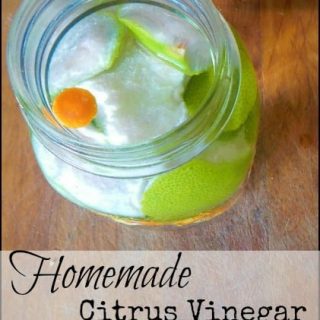Learn to make herbal infused vinegar with this easy tutorial! Use herbal vinegars for food, your beauty regimen, and even cleaning. Using fresh or dried herbs and your favorite vinegar and enjoy your herbal infused vinegar in only a few weeks. Free printable of the tutorial provided! 
How Do you Make Herbal Infused Vinegar?
Flavored vinegars are one of the easiest herbal preparations to make yourself, so don’t be intimidated if you’re new to this.
- The key is to use the freshest herbs and flowers and your favorite vinegar (mine is apple cider vinegar).
What Herbs Can you Infuse with Vinegar?
Did you know that some holidays like Vasant and Holi in the Hindu year have special herbs already assigned to them?
- To make an herbal infused vinegar for Vasant (the beginning of the Hindu spring celebration), gather 1-2 cups of mustard flower.
If mustard isn’t available where you live, try any of the following herbs for a vinegar infusion:
- Wild rose petals
- Lemon balm
- Rosemary
- Chives (and their flowers)
- Savory or tarragon
- Violets
- Citrus peels
- Dandelion flowers (with green backs removed)
This list should only be considered a place to start since there are many, many herbs both cultivated and foraged that you could infuse into vinegar successfully. You can even infuse fruits!
I’ll be sure to include some links below for further reading.
FYI, don’t be stingy with the herbs! The more, the merrier when it comes to flavoring vinegar.
- Unless you’re using garlic cloves and hot peppers, in which case be prudent, or your nostrils will catch on fire when you use the vinegar.
Not really (a little herbal hyperbole there), but you do want to be on the cautious side when it comes to fresh garlic and peppers.
What is the Best Vinegar to Infuse Herbs With?
There are many solvents in which you could infuse herbs for preparations; things like alcohol or even honey. A solvent is the fancy herbal term for the medium that is pulling all the neat flavors and oils from the herbs.
Vinegar is nice because it’s not as heavy-handed as alcohol and not as sweet as honey.
Before you can choose a suitable vinegar for your herbs, you need to decide what you’d like to use your herbal infused vinegar for.
- Will it be for salad dressing?
- Tossing into your daily drinking water?
- For cleaning the toilet?
- As a hair or skin enhancer?
Here are a few tips:
- While pasteurized white vinegar is perfectly usable, it’s a little brash in flavor so I typically save it for a cleaning vinegar.
- For culinary purposes, I prefer white wine or rice vinegar for light herbs like rose and lemon balm.
- For stronger herbs like sage and rosemary, I like raw apple cider vinegar because it holds its own in salad dressings and sauté dishes.
- If you’re infusing dandelion blooms into vinegar, it should probably be a white variety so that the finished product retains its gorgeous color.
Whatever vinegar you use should contain at least 5% acidity. You can test this with simple pH strip but most commercial vinegars have that information on the container.
Here’s some helpful information from our friends at Herbal Academy:
We recommend using vinegar-based herbal preparations within six months. Vinegar preparations in general are shelf-stable when made with no less than 5% vinegar (Cech, 2000; Green, 2000) and do not need to be refrigerated, although, refrigeration can help extend shelf life.
This is from their great article that I suggest you read if you’re a fan of herbal preparations, What Every Herbalist Should Know About Preparations Shelf Life.
Other Useful Articles for Later:
How to Plan and Plant a Wellness Herb Garden
How to Make Apple Chips and Light Apple Vinegar
Or maybe you’d like to grow your own herbs for infused vinegars and other recipes?
To get all this information, plus so much more on starting your own herb garden this year, please grab your copy of our newest book, The Everyday Herb Garden! Learn how to gather information about your site, brainstorm basic designs, prepare your soil naturally, as well as how to start your own herbal plants to save money and ensure quality. Bonus information includes how to harvest, preserve, and use your herbs. Click below to learn more and get your own copy of this useful little herb book!
Instructions to Make Herbal Infused Vinegars
Make Herbal Infused Vinegar
Equipment
- Glass Jar
- Lid
Ingredients
- 1 Cup Fresh Herbs 2 Cups Dried
- Enough Apple Cider Vinegar 5% acidity to Cover
Instructions
- In a jar, mix 2 cups of vinegar (at least 5% acidity) with 1 cup of herbs. You may use more herbs, if you'd like, as long as you follow step 2. If you're using dried herbs, use 2 cups.
- Be sure to submerge the herbs in the vinegar. Shake the
container to be sure the vinegar covers all the herbs. - Cap tightly* and allow to sit for at least three weeks
in a cool, dark place. - If the flavor isn’t strong enough, add more herbs and
allow it to sit at least another week. - Store infused vinegar in a cool, dark place or
refrigerate to extend flavor.
Notes
- Any vinegar that encounters metal will cause a reaction–you can get off colors and even rust.
- You can purchase plastic lids to fit small or width mouth canning jars.
Herbal Infused Vinegar Notes
Use clean herbs and place them in a glass jar. Cover with vinegar to saturate the herbs.

Cap the container, shake it gently to be sure all the herbs are covered in vinegar, and then place it in a cool, dark place to infuse.

As I mentioned in the tutorial, I like to use glass canning jars for my infused vinegars but beware using a metal seal and ring to close the jar. Any vinegar that encounters metal will cause a reaction–you can get off colors and even rust.
- If you use metal, simply put a plastic baggie or beeswax wrap in between the vinegar and the lid to prevent damage. You can also purchase plastic lids to fit wide or small mouth canning jars.
Technically, vinegar can store indefinitely, but you’ll want to use it within six months. The flavor starts to diminish after a while, though the refrigerator or a very cool root cellar will keep the flavor longer.
- Use your herbal vinegars as a base for salad dressings or dashed into your favorite casserole or potato salad.
- They can work as a soothing cleanse for bug-bitten skin, depending on the herbs.
I infuse citrus vinegar monthly to use as a cleaner around the house and when doing dishes.
How Long Does it Take to Infuse Vinegar?
The answer to this question is very relative, unfortunately!
A normal infusion time is three weeks to start out. Depending on the herb, you might be able to see some of the color drain out of the plant (like violets) and into the vinegar.
- When you open it, you should be able to smell any aromatic herbs (like rosemary or lavender) you’ve infused.
If you taste the vinegar after three weeks and it’s not strong enough for your palate, add more herbs and infuse for another week. Do this until it tastes the way you want it to.
As I cautioned earlier, be cautious about adding too much garlic or too many peppers like cayenne at first. Their oils are potent, powerful, and fragrant!
If you’d like a printed version of this tutorial, a copy will be sent to you when you join our newsletter family below. If you’re already a member of the family, the printable will be available in the member library for downloading and printing.
Commonly Asked Questions
Here are some of the most commonly asked questions about making your own herbal infused vinegars.
Can Infused Vinegar Go Bad?
Vinegar has been used as a preservative since the dawn of time because of its inherent level of acidity that prevents that growth of pathogens and harmful bacteria. So, no, vinegar with a high enough acidity level doesn’t “go bad”.
However, when you make an herbal infused vinegar, you add botanical material to the plain vinegar to steep. If not properly handle, these materials have the potential to cause spoilage.
Some Handy Tips to Keep Herbal Infused Vinegar Fresh:
- It’s important to strain all of the botanical material out when the infusion process is complete.
- You can do this with a fine mesh sieve or a piece of cheesecloth (especially effective if you have very fine particles).
- Refrain from squeezing the herbal materials to remove the last of the infused vinegar as this can lead to small particles returning to the vinegar batch. The chickens or the compost pile can benefit from these last dregs of materials.
- If you really don’t want to waste these bits of vinegar infused herbs, use them to scrub the kitchen sink or stainless steel countertops. I like to swish them around in a warm bath, as well.
- Always use your nose! Get used to how your fresh vinegars smell and taste and feel. If something smells off, use that batch to scrub the tub and start a fresh batch. Remember, you can infuse dried herbs into vinegar if the growing season has come to an end.
Do Infused Vinegars Need to be Refrigerated?
Herbal infused vinegars do not need to be refrigerated to stay shelf stable. However, keeping them in a cool environment like a fridge or root cellar can extend their life and flavor.
Six months is generally the palatable shelf life of an herbal infused vinegar; after that, the flavor fades and the vinegar can start to taste sharp.
If you’ve used white vinegar to make an herbal infusion AND you’ve filtered out the botanical matter to the best of your ability, the herbal infused vinegar will last longer without any off flavors.
However, white vinegar is basically dead vinegar and very acidic to ingest. If you plan to consume your herbal infused vinegar, use a living vinegar like raw apple cider vinegar (often abbreviated to ACV).
- ACV is full of probiotics and is actually quite beneficial for your health on its own.
- It is still alive and will, therefore, continue to age if kept at room temperature. This can lead to a very strong flavor, beyond what you might consider palatable.
As I mentioned, because of this, it can preserve flavor longer to keep your herbal infused vinegar in the fridge or root cellar.
If you’re using it as a hair rinse or cleaner, you will most likely be using it up long before it has a chance to start to fade. To be sure, infuse smaller batches at one time and use them within a few months.
Where Can I learn More About How to Use Herbs?
My favorite place for herbal education is The Herbal Academy!
You can visit their site below to see if they have a learning opportunity that will suit your needs.
They have courses for beginners to more advanced herbalists.
Other Herbal Infusion Resources
Here’s some further information on herbal infused vinegars and herbal oxymels (an herbal infusion with honey as the solvent).
Herbal Infused Vinegar Resources
Homemade Citrus Laundry Wash and Vinegar Cleaner
A simple vinegar to make for cleaning laundry or around the home.
Make Herbal Drinking Vinegar for Stamina in the Summer Heat
Herbal Vinegar Hair Rinses
Blueberry Herbal Vinegar {a brain food!}
Garlic and Thyme Oxymel
Nutrient-Dense Herbal Drink: Tulsi and Hibiscus Oxymel
Herbal Oxymel Recipe with Sage and Ginger
How to Make a Herbal Oxymel
—>>>Pin This Tutorial for Later<<<—


















Leave a Reply